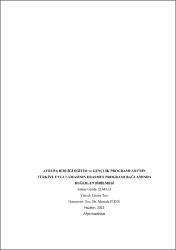| dc.contributor.advisor | Fişne, Mustafa | |
| dc.contributor.author | Elmalı, Güray Gözde | |
| dc.date.accessioned | 2015-03-26T13:08:04Z | |
| dc.date.available | 2015-03-26T13:08:04Z | |
| dc.date.issued | 2013 | |
| dc.date.submitted | 2013 | |
| dc.identifier.uri | http://hdl.handle.net/11630/3394 | |
| dc.description.abstract | Avrupa Birliği, eğitim ve gençlik alanlarında üye devletlerin sorumluluklarına, kültür ve dil farklılıklarına saygı gösterirken, eğitimde kalitenin artırılması için üye ülkeleri ulusal politikalarını oluştururken işbirliği yapmaya teşvik etmektedir. Avrupa Birliği Eğitim ve Gençlik Programları, “Hayatboyu Öğrenme” ve “Gençlik Programları” olmak üzere ikiye ayrılmaktadır.
Bu çalışmada öncelikle Avrupa’da eğitime ilişkin tarihi süreç ele alınarak, küreselleşme, bilgi toplumu ve eğitim kavramlarına değinilmiş ve Avrupa Birliği Programları’nın içeriği açıklanmıştır. Çalışmada, 2004 yılından itibaren Türkiye’de daha etkin yararlanılan Avrupa Birliği Eğitim ve Gençlik Programları’nın kurumsal alandaki yapılanmasını ve programa katılanlar üzerindeki sosyal, kültürel ve kişisel ve mesleki gelişime yönelik etkilerini ortaya çıkarmak amaçlanmaktadır. Bu amaç doğrultusunda, daha önce Erasmus programından faydalanan öğrencilere anket veri toplama tekniğinden faydalanarak sorular yöneltilmiş, genel olarak programa yönelik olumlu düşünceler ifade edilmiştir. | en_US |
| dc.description.abstract | The European Union respects the responsibilities of the member states in the fields of education, youth, culture and language differences and it encourages member states for cooperation while creating their national policies in order to enhance the quality of education. European Union Education and Youth Programmes are divided into two parts; Lifelong Learning (LLP) and Youth Programs.
In this study, firstly, the developments in Europe related to education are mentioned not only from a historical perspective but also from a more current perspective depending on the concepts of globalization and information society. It is in this context that the European Union Education and Youth Programmes are analysed, which have been implemented more efficiently in Turkey since 2004. Then, the impacts derived from the implementation of these programs in Turkey on institutional structure as well as on the beneficiary students’ social, cultural, and personal and professional development are searched on the basis of a questionnaire. The findings show a positive relationship between the use of Erasmus programme and the beneficiary students’ social, cultural, and personal and professional development. | en_US |
| dc.language.iso | tur | en_US |
| dc.publisher | Afyon Kocatepe Üniversitesi, Sosyal Bilimler Enstitüsü | en_US |
| dc.rights | info:eu-repo/semantics/openAccess | en_US |
| dc.subject | Avrupa Birliği | en_US |
| dc.subject | Bologna Süreci | en_US |
| dc.subject | Avrupa Birliği Eğitim ve Gençlik Programları | en_US |
| dc.subject | Erasmus Programı | en_US |
| dc.title | Avrupa Birliği Eğitim ve Gençlik Programları’nın Türkiye Uygulamasının Erasmus Programı Bağlamında Değerlendirilmesi | en_US |
| dc.title.alternative | Evaluation of the Implementation of the European Union Education and Youth Programmes in Turkey in the Context of Erasmus Programme | en_US |
| dc.type | masterThesis | en_US |
| dc.department | Afyon Kocatepe Üniversitesi, Sosyal Bilimler Enstitüsü, Kamu Yönetimi Anabilim Dalı | en_US |
| dc.relation.publicationcategory | Tez | en_US |



















